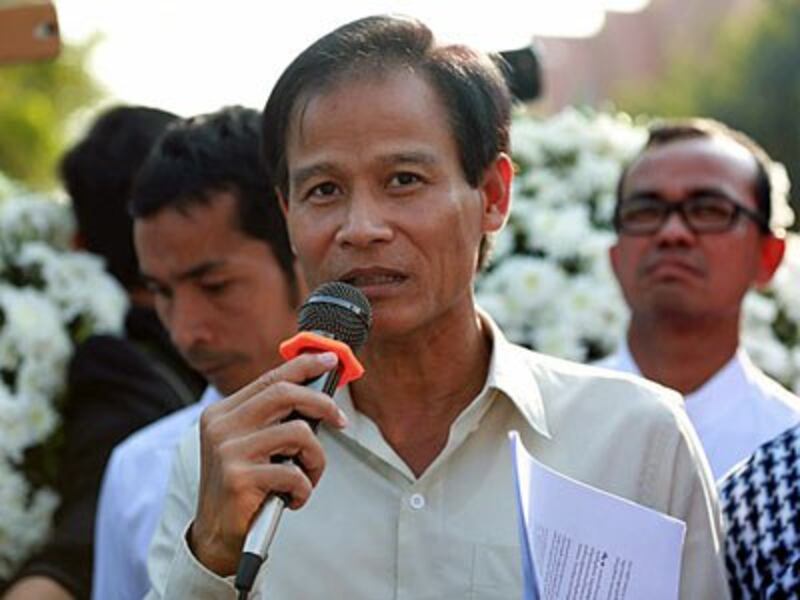Cambodian garment unions expressed concern on Friday that access to vital European Union and U.S. trade preferences could be under threat following the dissolution of the main opposition party under Prime Minister Hun Sen’s government last month.
The breakup of the Cambodia National Rescue Party (CNRP) and other moves by the administration to silence the opposition in the run-up to national elections next year has sparked international condemnation of the Southeast Asian country 25 years after a U.N.-led effort to help Cambodia get back on its feet after civil war and brutal Khmer Rouge rule.
International donors, including the EU and U.S., have said that they are ending aid to Cambodia or ramping up threats to do so in light of Hun Sen’s crackdown on the CNRP, independent media outlets, and NGOs. Critics say the prime minister has damaged the country’s fragile democracy and thrown the legitimacy of an upcoming ballot into question.
Hun Sen has made things even harder for Cambodia with his frequent taunting of Western donors over their criticism of the crackdown, much of which appears to violate the 1991 Paris Peace Agreements, which ended the war between Vietnam and Cambodia and led to the U.N.’s administration of Cambodia’s government while the country transitioned to a system of democratic elections.
Garment worker unions and the Garment Manufacturers Association of Cambodia (GMAC), which represents the country’s roughly 600 garment and footwear factories, are concerned about the impact on the nearly U.S. $7 billion textile industry should the EU and U.S. discontinue trade agreements with the country.
Some union leaders believe that garment industry jobs will be at stake if the international community decides to impose sanctions on Cambodia.
“If the international community puts sanctions on Cambodia, garment factory workers will be the ones who are affected the most because they rely solely on their small salaries to make ends meet,” said Ath Thon, president of the Coalition of Cambodian Apparel Workers' Democratic Union, one of the country’s largest independent unions which was involved in October wage negotiations with the government.
“Many of them owe money to banks,” he said. “If they lose their jobs because the factories are closed, they will face assets forfeiture by the banks to pay their debts.”
Cambodia’s 700,000 garment workers earn a monthly minimum wage of U.S. $153, an amount that is set to increase to U.S. $170 in 2018.

Possible social unrest
Chea Mony, former president of the Free Trade Union of the Workers of the Kingdom of Cambodia, said retaliatory measures against the country could cause social unrest with mass protests by garment workers who lose their jobs.
“When people are frustrated and desperate, they gather and protest to find ways out,” he said. “They will not be afraid to die no matter how harshly the authorities impose restrictions on them. It will be impossible to stop them from protesting.”
Both Ath Thon and Chea Mony urged Hun Sen, who has been courting garment workers in the run-up to the election, to reconsider his actions and engage in talks with the CNRP to resolve the current political crisis.
“If the ruling party and the opposition start a dialogue to bring the current political tension back to normality and restore the democratic process and political stability, it would be great,” Ath Thon said.
“Let’s not forget that the preferential agreements are based on how Cambodia respects human rights and democracy,” he said.
Cambodia continues to enjoy trading preferences from both the EU and U.S. even though it has been elevated from a least developed country status to a lower middle-income country. The EU's Everything But Arms (EBA) trade deal with Cambodia allows the bloc to imports garments both duty free and quota free.
In 2016, garment and footwear products made up some 80 percent of Cambodia’s total merchandise exports, with 43 percent shipped to the EU, and 29 percent exported to the U.S., according to the U.N.’s International Labour Organization.
US threats
U.S. senators have raised threats of sanctions on Cambodia over the jailing of CNRP leader Kem Sokha on charges of treason and have drafted a resolution in support of a bill urging the State Department and Treasury Department to block the assets of senior Cambodian officials and prevent U.S. nationals from doing business with them.
The U.S also has stopped providing election support for Cambodia.
“If Hun Sen composes himself and reconsiders the ways he does things so that the EU and U.S. trust him, then there will be no sanctions to be imposed on his government,” Chea Mony said. “If he does not change, then he will be the one to be blamed for making things worse.”
The moves by the U.S. have prompted the Cambodian Council of National Unions (CCNU) to request a meeting with American Ambassador to Cambodia William Heidt so it can make a case as to why the U.S. should not stop buying clothes from Cambodia.
“We have monitored very closely the recent developments in relation to the dissolution of the opposition party,” CCNU president Tol Phanmoeung wrote in a letter dated Nov. 29. “We have also noted the EU’s strong reactions to the government’s actions and their threats to stop buying goods from Cambodia.”
“However, we don’t want to see workers falling victims to or becoming hostages of political groups,” the letter said. “We therefore would like to ask the U.S. to continue buying goods from Cambodia under the preferential agreement.”
Reported by RFA’s Khmer Service. Translated by Nareth Muong. Written in English by Roseanne Gerin.
